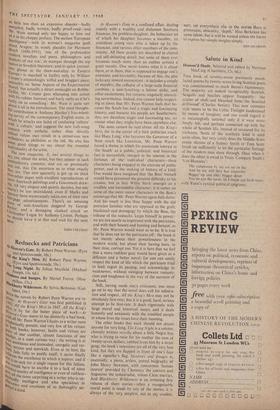Rednecks and Patricians
(1°Ivs and Images. By Meriol Trevor. (Mac- k, 15s.) `ackberry Wilderness. By Sylvia Berkman. (Gol- lanez, 16s.) .111 the novels by Robert Penn Warren are re- s1hts At Heaven's Gate was first published in 413; All the King's 'Men in 1947. All the King's Wis by far the better piece of work—At ith 'i's Gate seems to me distinctly a bad book, Mr. Penn Warren's faults as a writer most lo Pbttatically present, and very few of his virtues. Dart,oth books, however, faults and virtues arc of one another, almost functions, of one oneter, in a most curious way: the writing is at bn_c ambitious and immodest, energetic and ver- w07, serious and mawkish. Even at its best, the eii( fails fully to justify itself; it never finally Nele.ves the excellence to which it aspires; and if one is to seek for a single reason for this failure, esse Would have to ascribe it to a lack of some tress quality of intelligence or even of ruthless-- tloa,all the more surprising in a writer who is un- ehat`.:tedlY intelligent and who specialises in
gen "tee]akters ind. and emotions of so thoroughly un-
At Heaven'.s Gate is a confused affair, dealing mainly with a wealthy and dishonest Southern financier, his problem-daughter, the bohemian set of which his daughter becomes a member, an ambitious young man who is taken up by the financier, and various other members of the com- munity. All these people are described in clotted and self-defeating detail; but none of them ever becomes much more than an outline around a great vacuity. One never knows what it is about them, or in them, that is supposed to engage one's attention, and inevitably, because of this, the plot lacks any inward momentum : it includes a couple of murders, the collapse of a large-scale financial combine, a near-lynching,' a labour strike, and other excitements, but remains singularly unexcit- ing nevertheless. Indeed, one cannot help suspect- ing at times that Mr. Penn Warren feels that be- cause the South has had a tragic and fascinating history, and because his people are Southerners. they are therefore tragic and fascinating too, no matter what they might have been anywhere else.
The same cannot be said about All the King's Men, for in the career of a hick politician much like Huey Long, who becomes the Governor of a State much like Louisiana, Mr. Penn Warren found a theme in which his passionate interest in 'the South' as a public, political, and historical fact is successfully merged in his interest in the fortunes of the individual characters—these characters being engaged in the exercise of public power, and in the making of history of a kind. One would have imagined that 'the Boss' himself would have presented the greatest difficulty to his creator, but in fact Willie Stark emerges as a credible and formidable character; it is rather on some of -the more minor characters in the Boss's entourage that Mr. Penn Warren again falls down. And his touch is less than happy with the Old patrician families who are opposed to the graft, blackmail and demagogy by which the Boss, the tribune of the rednecks, keeps himself in power : we are not nearly as impressed with the patricians, and with their houses and hunting and honour, as Mr. Penn Warren would want us to be. It is true that he does not let the patricians off: the book is not merely about their powerlessness in the modern world, but about their having been, in their time, corrupt too. Yet it is here that we feel that a more ruthless gaze would have given us a different and a better novel; for one can surely respect the kind of life which the patricians tried to lead, regret its passing, and acknowledge its weaknesses, without swinging between romanti-. cism and toughness in the way of the narrator of the book.
Still, having made one's criticisms, one must go on to say that the novel does call for admira- tion and respect. All the King's Men may not be absolutely first-rate; but it is a good, hard, serious attempt to be first-rate. It deals vigorously with large moral and historical issues, and it deals honestly and anxiously with the troubled people in whose lives the issues have their meaning.
The other books this week shOuld not detain anyone for very long. The Long Night is a solemn, clumsily written novella about a little Negro boy who is trying to raise for his mother the sum of twenty-seven dollars, robbed from him by a street gang; the book's intentions are all of the very best kind, but they are flapped in front of one's face like a signaller's flag. Shadows and finages is, essentially, a pious, artless, potted biography of John Henry Newman, with concurrent 'human interest' provided by Clemency the convert and Augustine the industrialist, whom Clem marries. And Blackberry Wilderness is an irritating first volume of short stories—when a recognisable moral point is made by any of the stories, it is always of the very simplest, not to say crudest, sort; yet everywhere else in the stories there is pretension, obscurity, 'depth.' Miss Berkman has some talent; but it will be wasted unless she learns to express her simple insights simply.


































 Previous page
Previous page